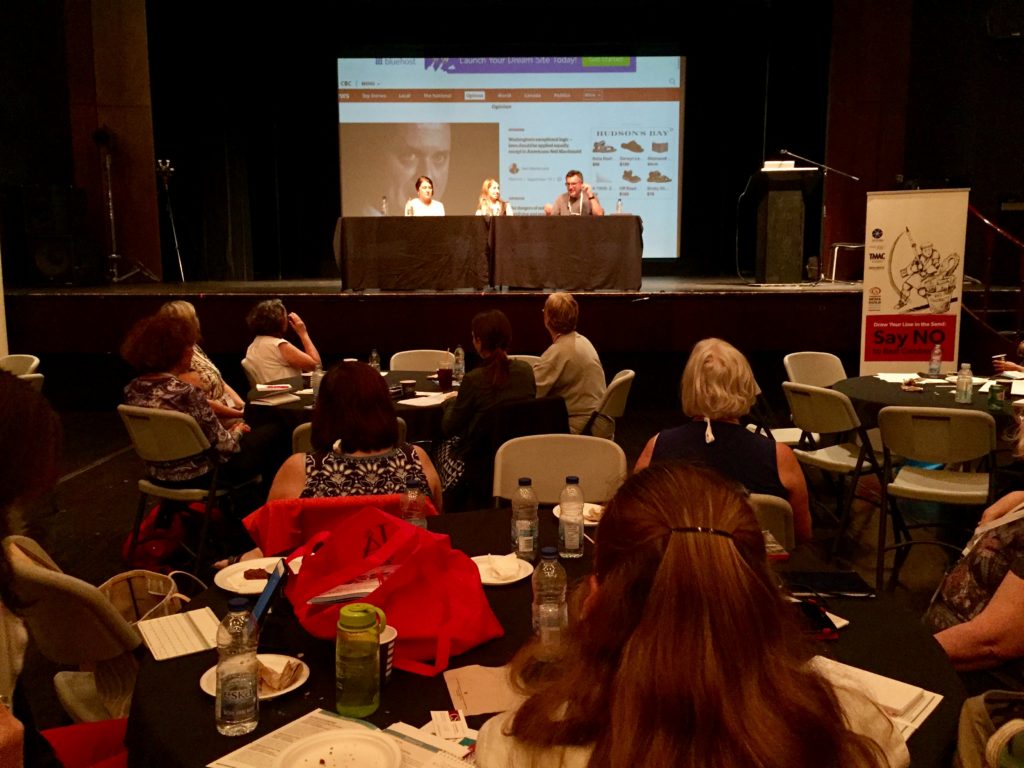Getting freelance work with the CBC

Tanya Springer, Robyn Urback and Don Genova
Freelancing for CBC isn’t as easy as it used to be, but there are still gigs to be found at the Mother Corp. The “Getting Work With the CBC” panel at the recent Level Up conference in Toronto offered some insights into just where to find it.
The panel was part of a two-day conference co-presented by PWAC and CMG Freelance. CBC Podcasts senior producer Tanya Springer and CBC Opinions editor Robyn Urback, along with moderator Don Genova, went over some of the opportunities available for freelancers at CBC.
CBC Opinion
Because CBC’s journalistic standards prevent CBC staff members from expressing opinions publicly, all CBC Opinions columns (aside from posts written by Urback and Neil Macdonald) come from freelancers.
Since CBC doesn’t have advertisers to worry about, Urback said she has more freedom and flexibility than other publishers. This allows her to seek out new writers or writers who may never have considered writing an opinion piece. She makes time to work with new writers by relying on more experienced freelancers who can turn around assignments quickly without too much supervision.
Freelance opinion writers don’t need to be experienced – all you need is a good idea. Urback takes columns on a wide range of topics, from politics, to healthcare, to social issues, to celebrities. As long as the column reflects Canada and has a strong news hook, she said, the field is open.
Like most editors, Urback gets a lot of pitches. To stand out in her crowded inbox, Urback recommended putting as much key information as possible right in your email subject line. If she can understand the argument in your column without even opening the email, she said, it has a better chance of being assigned. If a pitch catches her eye and she has room the day it arrives, she sometimes assigns it immediately.
Specific ideas have a better chance, said Urback. She wants a take that’s dynamic, that hasn’t been said a million times before. And the best columns, she said, are ones that don’t disparage the other side of the argument.
CBC Opinion pays CMG rates for everything they publish. Columns should be no more than 800 words in length and the CMG rate is 60 cents a word. You can send pitches to robyn.urback@cbc.ca.
The Doc Mentorship Program
Tanya Springer is the former coordinator of CBC’s Doc Mentorship initiatives. The mentorship program was created in 2014 to help pass on retiring doc makers’ knowledge to new documentary makers. The program works with a roster of in-house mentors who are paired with staff members and freelancers who have had documentary pitches accepted.
One hundred and fifteen people have been through the program so far, 50 percent of whom are freelancers. Now in its fifth year, the program has a brand new Doc Makers portal. In addition to the Doc Mentorship Program, freelancers can also apply to the Advanced Doc Makers Program and the Emerging Indigenous Doc Maker Program.
Freelancers who apply to the program need to have some experience in audio storytelling — that means a working knowledge of audio editing, possibly some freelance work with CBC in the past, or at least some audio work streamable somewhere online, even if it’s something you’ve produced yourself. All stories produced in the program have to take place in Canada. Applicants are encouraged to reach out to prospective mentors to workshop their pitch before submitting it.
The next two Doc Mentorship Program deadlines are December 3, 2018 and February 3, 2019.
CBC Podcasts
Springer has recently moved from the Doc Mentorship Program into a full time position with CBC Podcasts. Three years ago, CBC started experimenting with producing original podcasts and is releasing eleven new podcasts this fall. The beauty of podcasting, said Springer, is that you can appeal to a niche audience. With radio you have to have a national audience in mind, but with podcasting you can have a specific demographic in mind.
CBC Podcasts accepts pitches year round. The bar is high, but they hire freelancers and second producers from other parts of CBC to work on podcasts. The podcasting department recently partnered with two existing independent podcast companies for the first time. They also commission freelancers and work in a more arms-length fashion with them
If you’re thinking of pitching a podcast, said Springer, keep in mind that CBC Podcasts is all about innovation. If your story has already been reported on, you’ll need to explain why it’s worthy of a podcast. A podcast pitch has to prove that a subject has the legs to keep a listener’s interest for six or ten episodes.
You can find more information about pitching podcast ideas on CBC’s radio pitch guide page.



